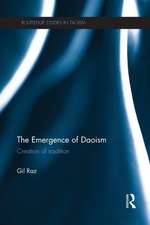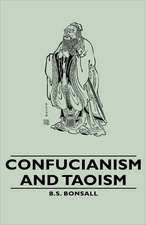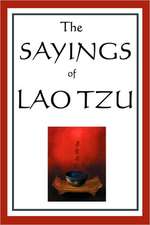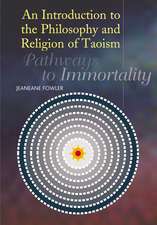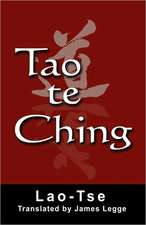Linguistic Strategies in Daoist Zhuangzi and Chan Buddhism: The Other Way of Speaking
Autor Youru Wangen Limba Engleză Paperback – 13 feb 2014
| Toate formatele și edițiile | Preț | Express |
|---|---|---|
| Paperback (1) | 321.63 lei 43-57 zile | |
| Taylor & Francis – 13 feb 2014 | 321.63 lei 43-57 zile | |
| Hardback (1) | 767.74 lei 43-57 zile | |
| Taylor & Francis – 17 apr 2003 | 767.74 lei 43-57 zile |
Preț: 321.63 lei
Preț vechi: 415.50 lei
-23% Nou
Puncte Express: 482
Preț estimativ în valută:
61.54€ • 64.42$ • 51.22£
61.54€ • 64.42$ • 51.22£
Carte tipărită la comandă
Livrare economică 31 martie-14 aprilie
Preluare comenzi: 021 569.72.76
Specificații
ISBN-13: 9780415868341
ISBN-10: 0415868343
Pagini: 264
Dimensiuni: 138 x 216 x 20 mm
Greutate: 0.32 kg
Ediția:1
Editura: Taylor & Francis
Colecția Routledge
Locul publicării:Oxford, United Kingdom
ISBN-10: 0415868343
Pagini: 264
Dimensiuni: 138 x 216 x 20 mm
Greutate: 0.32 kg
Ediția:1
Editura: Taylor & Francis
Colecția Routledge
Locul publicării:Oxford, United Kingdom
Public țintă
Postgraduate and UndergraduateRecenzii
'Youru Wang carefully examines in this provocative and systematic work the variety of linguistic tactics involved in two ways of speaking that challenge coventional speech and understanding.' - Journal of Chinese Philosophy,Volume 32, Issue 4 (December 2005)
'Youru Wang carefully examines in this provocative and systematic work the variety of linguistic tactics involved in two ways of speaking that challenge coventional speech and understanding.' - Journal of Chinese Philosophy,Volume 32, Issue 4 (December 2005)
'...this is a very rich book, articulate, nuanced, and thoughtful, rewarding its readers with a systematic appreciation of why the Zhuangzi and some Chan Buddhist texts are so effective in promoting their respective soteriological vision through a dazzlingly creative use of language.' - TAO JIANG, Rutgers University, Journal of Chinese Religions, 2008
'Youru Wang carefully examines in this provocative and systematic work the variety of linguistic tactics involved in two ways of speaking that challenge coventional speech and understanding.' - Journal of Chinese Philosophy,Volume 32, Issue 4 (December 2005)
'...this is a very rich book, articulate, nuanced, and thoughtful, rewarding its readers with a systematic appreciation of why the Zhuangzi and some Chan Buddhist texts are so effective in promoting their respective soteriological vision through a dazzlingly creative use of language.' - TAO JIANG, Rutgers University, Journal of Chinese Religions, 2008
Cuprins
1. Introduction Part 1 Deconstruction in the Zhuangzi and in Chan Buddhism 2. Understanding Deconstruction through the Zhuangzi and Chan 3. Zhuangzi's Dao Deconstructs and Zhuangzi deconstructs his Dao 4. The Deconstruction of Buddha Nature in Chan Buddhism Part 2 The Liminology of Language in the Zhuangzi and in Chan Buddhism 5. What is a Liminology of Language? 6. Zhuangzi's Liminology of 'Speaking Non-Speaking' 7. The Chan Contribution to the Liminology of Language Part 3 Pragmatics of Indirect Communication in the Zhuangzi and in Chan Buddhism 8. The Displacement of Indirect Communcation 9. The Pragmatics of 'Goblet Words'. Indirect Communication in the Zhuangzi 10. The Pragmatics of 'Never Tell Too Plainly': Indirect Communication in Chan 11. Concluding Remarks
Notă biografică
Youru Wang teaches Asian thought in the Philosophy and Religion Department at Rowan University, Glassboro, New Jersey. His area of speciality is Chinese Buddhist thought and early Daoist thought. His articles have appeared in journals such as International Philosophical Quarterly, Philosophy East and West, Asian Philosophy, and Journal of Chinese Philosophy.
Descriere
Whilst focusing on language use, the study reveals some important truths about Daoist Zhuangzi and Chan Buddhism and challenges many conventional understandings of them.










